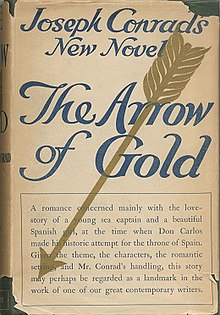
Heart of Darkness is an 1899 novella by Polish-British novelist Joseph Conrad in which the sailor Charles Marlow tells his listeners the story of his assignment as steamer captain for a Belgian company in the African interior. The novel is widely regarded as a critique of European colonial rule in Africa, whilst also examining the themes of power dynamics and morality. Although Conrad does not name the river on which most of the narrative takes place, at the time of writing, the Congo Free State—the location of the large and economically important Congo River—was a private colony of Belgium's King Leopold II. Marlow is given a text by Kurtz, an ivory trader working on a trading station far up the river, who has "gone native" and is the object of Marlow's expedition.

Joseph Conrad was a Polish-British novelist and story writer. He is regarded as one of the greatest writers in the English language and although he did not speak English fluently until his twenties, he became a master prose stylist who brought a non-English sensibility into English literature. He wrote novels and stories, many in nautical settings that depict crises of human individuality in the midst of what he saw as an indifferent, inscrutable and amoral world.
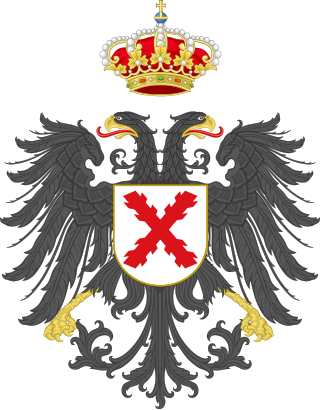
Carlism is a Traditionalist and Legitimist political movement in Spain aimed at establishing an alternative branch of the Bourbon dynasty, one descended from Don Carlos, Count of Molina (1788–1855), on the Spanish throne.
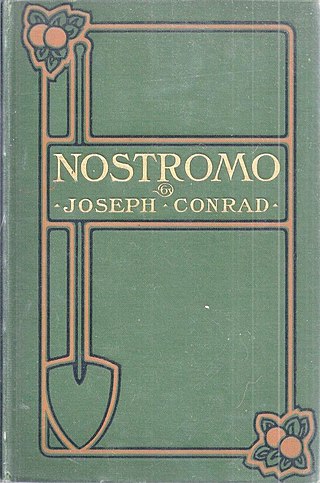
Nostromo: A Tale of the Seaboard is a 1904 novel by Joseph Conrad, set in the fictitious South American republic of "Costaguana". It was originally published serially in monthly instalments of T.P.'s Weekly.

Lord Jim is a novel by Joseph Conrad originally published as a serial in Blackwood's Magazine from October 1899 to November 1900. An early and primary event in the story is the abandonment of a passenger ship in distress by its crew, including a young British seaman named Jim. He is publicly censured for this action and the novel follows his later attempts at coming to terms with himself and his past and seeking redemption and acceptance.

The Third Carlist War, which occurred from 1872 to 1876, was the last Carlist War in Spain. It is sometimes referred to as the "Second Carlist War", as the earlier "Second" War (1847–1849) was smaller in scale and relatively trivial in political consequence.
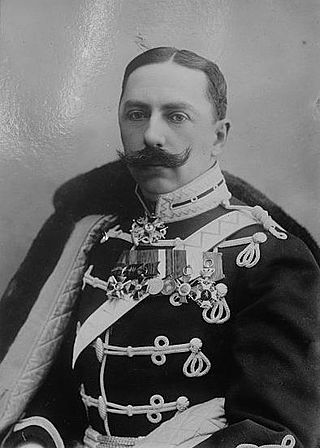
Jaime de Borbón y de Borbón-Parma, known as Duke of Madrid, was the Carlist claimant to the throne of Spain under the name Jaime III and the holder of the Legitimist claim to the throne of France as Jacques I.
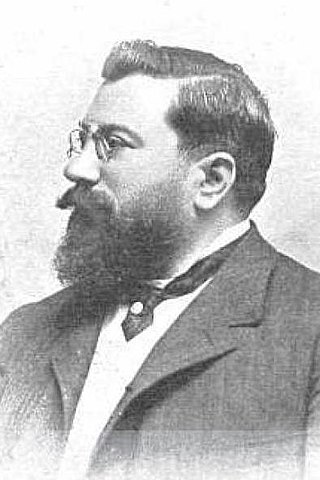
Juan Vázquez de Mella y Fanjul (1861–1928) was a Spanish politician and a political theorist. He is counted among the greatest Traditionalist thinkers, at times considered the finest author of Spanish Traditionalism of all time. A politician active within Carlism, he served as a longtime Cortes deputy and one of the party leaders. He championed an own political strategy, known as Mellismo, which led to secession and formation of a separate grouping.
The Adventures and Misadventures of Maqroll is a compilation of novellas by Colombian author Álvaro Mutis. The previously published novellas were published as a two-volume collection in Colombia in 1993. An English translation by Edith Grossman was published in 2002. The novellas center on the exploits and adventures of Maqroll the Gaviero, and his travels on sea and on land across the world.
Richard Curle (1883–1968) was a Scottish author, critic, and journalist. He was a friend of the novelist Joseph Conrad, who was also the subject of several of his critical works.

Jane Anderson was an American-Spanish war reporter journalist who broadcast Nazi propaganda in Germany during World War II. She was indicted on charges of treason in 1943, but charges were dropped after the war for lack of evidence.

Juan Gabriel Vásquez is a Colombian writer, journalist and translator. He has written many novels, short stories, literary essays, and numerous articles of political commentary.

Joseph Conrad was a Polish author who wrote in English after settling in England. He is regarded as one of the greatest writers in English, though he did not speak the language fluently until he was in his twenties, and always with a marked Polish accent. Before embarking on writing, he had a career sailing in the French, then the British, merchant marine. Of his 19-year merchant-marine career, about half that time was spent actually at sea.

Nautical fiction, frequently also naval fiction, sea fiction, naval adventure fiction or maritime fiction, is a genre of literature with a setting on or near the sea, that focuses on the human relationship to the sea and sea voyages and highlights nautical culture in these environments. The settings of nautical fiction vary greatly, including merchant ships, liners, naval ships, fishing vessels, life boats, etc., along with sea ports and fishing villages. When describing nautical fiction, scholars most frequently refer to novels, novellas, and short stories, sometimes under the name of sea novels or sea stories. These works are sometimes adapted for the theatre, film and television.

Ramón Nocedal Romea (1842–1907) was a Spanish Catholic ultraconservative politician, first member of the Neocatólicos, then of the Carlists, and finally of the Integrists. He is known as leader of a political current known as Integrismo (1888–1907) and a chief representative of Catholic fundamentalism when applied to politics.

Tirso de Olazábal y Lardizábal, 1st Count of Arbelaiz, 1st Count of Oria, was a Spanish noble and Carlist politician.

Villa Arbelaiz, also called Villa Arbelaïtz, was a Belle Époque-style villa in Saint-Jean-de-Luz, Pyrénées-Atlantiques, France. It was the residence-in-exile of the Carlist politician Tirso de Olazábal y Lardizábal, Count of Arbelaiz.

Mellismo was a political practice of Spanish ultra-Right of the early 20th century. Born within Carlism, it was designed and championed by Juan Vázquez de Mella, who became its independent political leader after the 1919 breakup. The strategy consisted of an attempt to build a grand ultra-Right party, which in turn would ensure transition from liberal democracy of Restauración to corporative Traditionalist monarchy. Following secession from Carlism Mellismo assumed formal shape of Partido Católico-Tradicionalista, but it failed as an amalgamating force and decomposed shortly afterwards. Mellismo refers both to the political faction led by Mella and its strategy, and Mella's theoretical conception, which is nonetheless considered an integral component of Carlist ideology. In historiography its followers are usually referred to as Mellistas, though initially the term Mellados seemed to prevail. Occasionally they are also named Tradicionalistas, but the term is extremely ambiguous and might denote also other concepts.

On March 21, 1890, at a conference dedicated to the siege of Bilbao during the Third Carlist War, Miguel de Unamuno delivered a lecture titled La última guerra carlista como materia poética. It was probably the first-ever attempt to examine the Carlist motive in literature, as for the previous 57 years the subject had been increasingly present in poetry, drama and novel. However, it remains paradoxical that when Unamuno was offering his analysis, the period of great Carlist role in letters was just about to begin. It lasted for some quarter of a century, as until the late 1910s Carlism remained a key theme of numerous monumental works of Spanish literature. Afterward, it lost its appeal as a literary motive, still later reduced to instrumental role during Francoism. Today it enjoys some popularity, though no longer as catalyst of paramount cultural or political discourse; its role is mostly to provide exotic, historical, romantic, and sometimes mysterious setting.
